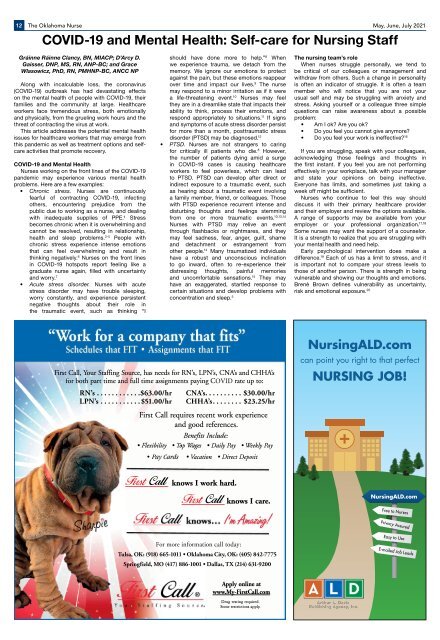Oklahoma Nurse - May 2021
You also want an ePaper? Increase the reach of your titles
YUMPU automatically turns print PDFs into web optimized ePapers that Google loves.
12<br />
The <strong>Oklahoma</strong> <strong>Nurse</strong> <strong>May</strong>, June, July <strong>2021</strong><br />
COVID-19 and Mental Health: Self-care for Nursing Staff<br />
Gráinne Ráinne Clancy, BN, MIACP; D’Arcy D.<br />
Gaisser, DNP, MS, RN, ANP-BC; and Grace<br />
Wlasowicz, PhD, RN, PMHNP-BC, ANCC NP<br />
Along with incalculable loss, the coronavirus<br />
(COVID-19) outbreak has had devastating effects<br />
on the mental health of people with COVID-19, their<br />
families and the community at large. Healthcare<br />
workers face tremendous stress, both emotionally<br />
and physically, from the grueling work hours and the<br />
threat of contracting the virus at work.<br />
This article addresses the potential mental health<br />
issues for healthcare workers that may emerge from<br />
this pandemic as well as treatment options and selfcare<br />
activities that promote recovery.<br />
COVID-19 and Mental Health<br />
<strong>Nurse</strong>s working on the front lines of the COVID-19<br />
pandemic may experience various mental health<br />
problems. Here are a few examples:<br />
• Chronic stress. <strong>Nurse</strong>s are continuously<br />
fearful of contracting COVID-19, infecting<br />
others, encountering prejudice from the<br />
public due to working as a nurse, and dealing<br />
with inadequate supplies of PPE.¹ Stress<br />
becomes chronic when it is overwhelming and<br />
cannot be resolved, resulting in relationship,<br />
health and sleep problems. 2-5 People with<br />
chronic stress experience intense emotions<br />
that can feel overwhelming and result in<br />
thinking negatively. 6 <strong>Nurse</strong>s on the front lines<br />
in COVID-19 hotspots report feeling like a<br />
graduate nurse again, filled with uncertainty<br />
and worry. 7<br />
• Acute stress disorder. <strong>Nurse</strong>s with acute<br />
stress disorder may have trouble sleeping,<br />
worry constantly, and experience persistent<br />
negative thoughts about their role in<br />
the traumatic event, such as thinking “I<br />
should have done more to help.” 8 When<br />
we experience trauma, we detach from the<br />
memory. We ignore our emotions to protect<br />
against the pain, but these emotions reappear<br />
over time and impact our lives. 9 The nurse<br />
may respond to a minor irritation as if it were<br />
a life-threatening event. 10 <strong>Nurse</strong>s may feel<br />
they are in a dreamlike state that impacts their<br />
ability to think, process their emotions, and<br />
respond appropriately to situations. 11 If signs<br />
and symptoms of acute stress disorder persist<br />
for more than a month, posttraumatic stress<br />
disorder (PTSD) may be diagnosed. 12<br />
• PTSD. <strong>Nurse</strong>s are not strangers to caring<br />
for critically ill patients who die. 8 However,<br />
the number of patients dying amid a surge<br />
in COVID-19 cases is causing healthcare<br />
workers to feel powerless, which can lead<br />
to PTSD. PTSD can develop after direct or<br />
indirect exposure to a traumatic event, such<br />
as hearing about a traumatic event involving<br />
a family member, friend, or colleagues. Those<br />
with PTSD experience recurrent intense and<br />
disturbing thoughts and feelings stemming<br />
from one or more traumatic events. 10,13,14<br />
<strong>Nurse</strong>s with PTSD may relive an event<br />
through flashbacks or nightmares, and they<br />
may feel sadness, fear, anger, guilt, shame<br />
and detachment or estrangement from<br />
other people. 14 Many traumatized individuals<br />
have a robust and unconscious inclination<br />
to go inward, often to re-experience their<br />
distressing thoughts, painful memories<br />
and uncomfortable sensations. 15 They may<br />
have an exaggerated, startled response to<br />
certain situations and develop problems with<br />
concentration and sleep. 5<br />
The nursing team’s role<br />
When nurses struggle personally, we tend to<br />
be critical of our colleagues or management and<br />
withdraw from others. Such a change in personality<br />
is often an indicator of struggle. It is often a team<br />
member who will notice that you are not your<br />
usual self and may be struggling with anxiety and<br />
stress. Asking yourself or a colleague three simple<br />
questions can raise awareness about a possible<br />
problem:<br />
• Am I ok? Are you ok?<br />
• Do you feel you cannot give anymore?<br />
• Do you feel your work is ineffective? 16<br />
If you are struggling, speak with your colleagues,<br />
acknowledging those feelings and thoughts in<br />
the first instant. If you feel you are not performing<br />
effectively in your workplace, talk with your manager<br />
and state your opinions on being ineffective.<br />
Everyone has limits, and sometimes just taking a<br />
week off might be sufficient.<br />
<strong>Nurse</strong>s who continue to feel this way should<br />
discuss it with their primary healthcare provider<br />
and their employer and review the options available.<br />
A range of supports may be available from your<br />
employer or your professional organization. 17,18<br />
Some nurses may want the support of a counselor.<br />
It is a strength to realize that you are struggling with<br />
your mental health and need help.<br />
Early psychological intervention does make a<br />
difference. 19 Each of us has a limit to stress, and it<br />
is important not to compare your stress levels to<br />
those of another person. There is strength in being<br />
vulnerable and showing our thoughts and emotions.<br />
Brené Brown defines vulnerability as uncertainty,<br />
risk and emotional exposure. 20<br />
RN’s............ $63.00/hr<br />
LPN’s........... $51.00/hr<br />
CNA’s...........$30.00/hr<br />
CHHA’s.........$23.25/hr<br />
NursingALD.com<br />
can point you right to that perfect<br />
NURSING JOB!<br />
• Pay Cards<br />
NursingALD.com<br />
Free to <strong>Nurse</strong>s<br />
Privacy Assured<br />
For more information call today:<br />
Tulsa, OK: (918) 665-1011 • <strong>Oklahoma</strong> City, OK: (405) 842-7775<br />
Springfield, MO (417) 886-1001 • Dallas, TX (214) 631-9200<br />
Easy to Use<br />
E-mailed Job Leads

















